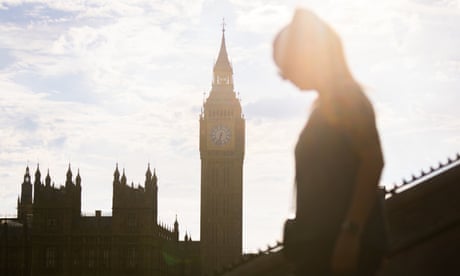Extract from The Guardian
Emergency meeting held on Saturday afternoon as Met Office warns ‘lives are at risk’

Sat 16 Jul 2022 22.14 AEST
First published on Sat 16 Jul 2022 17.39 AESTAfter an emergency Cobra committee meeting on Saturday afternoon, Cabinet Office minister Kit Malthouse has warned transport services face “significant disruption” due to the heatwave.
In an unofficial return to the work from home guidance issued during the Covid pandemic, Malthouse told BBC News: “Obviously the transport providers are messaging people that they should only travel if they really need to on Monday and Tuesday.
“Services are going to be significantly affected. The heat will affect rails, for example, so the trains have to run slower. There may be fewer services. People need to be on their guard for disruption. If they don’t have to travel, this may be a moment to work from home.”
Temperatures are expected to peak on Tuesday, with an 80% chance of the mercury topping the UK’s record temperature of 38.7C (101.7F) set in Cambridge in 2019, and a 50% chance of temperatures reaching 40C somewhere in the UK.
Concern over high temperatures has prompted the Met Office to issue its first red warning for Monday and Tuesday, applicable to an area from London to Manchester, and up to the Vale of York.
Heatwaves have been made hotter, longer and more frequent by climate breakdown, and experts have warned of the need to adapt homes and cities in the UK for a future of more intense – and deadly – summer heat.
Prof Peter Stott, Met Office science fellow in climate attribution, said the “scorching future our climate models have been predicting for years is now with us”.
It came as the UK Health Security Agency (UKHSA) increased its heat health warning to level 4, a “national emergency”.
Speaking on BBC Radio 4’s Today programme, the UKSHA’s top scientist, Prof Isabel Oliver, said everybody could be affected by such high temperatures.
“Last year we didn’t reach temperatures anywhere near the ones that are predicted for next week, [and] we saw over 1,600 excess deaths associated with the period of heatwave. So this is why we are keen that everybody knows what they can do to stay safe,” she said.
The reality behind the red warning has been described as “very serious” by Met Office spokesperson Grahame Madge, who advised those with vulnerable relatives or neighbours to start putting heat management measures in place.
“If the forecast is as we think it will be in the red warning area, then people’s lives are at risk,” he said.
An amber warning covering much of England and Wales has been issued from Sunday until Tuesday.
Transport for London (TfL) was already advising passengers to travel only for essential journeys.
The firm’s chief operating officer, Andy Lord, said: “If customers do need to travel, they should check before they travel, as we are expecting there to be some impact to tube and rail services as a result of temporary speed restrictions we will need to introduce to keep everyone safe.”
Very hot temperatures can affect rails, overhead power lines and signalling equipment, and TfL said it would work to keep as many services running as possible using “enhanced” inspections to mitigate the impact of the extreme weather.
Track temperature checks would be carried out regularly across the tube and rail networks to ensure they remained safe and that the track was not at risk of bending or buckling, TfL said in a statement.
It added it was also inspecting the air conditioning units on the trains that cover 40% of the tube network, the trains on the Elizabeth Line and London Overground, as well as the air cooling units on double-deck buses to ensure they were functioning well.
Transport for Greater Manchester has also urged its passengers to travel only if necessary.
NHS doctor Claire Bronze said the heatwave, added to surging numbers of Covid-19 cases – was proving a “nightmare” for health workers.
“We’ve got ambulances queueing to get in, we’ve seen a lot of Covid cases again, and then there’s the heat,” she said.
“There’s all these things happening that are just a bit of a nightmare and we’re worried about how it is going to affect patients and staff.”
Elsewhere, a number of schools are closing while others are ditching uniforms to combat the effects of soaring temperatures.
While the Department for Education is not currently advising schools to shut, it has emphasised that school leaders should “make sure they take any steps necessary to make sure children are safe and comfortable”.
The heatwave’s impact is being felt across mainland Europe, as thousands of firefighters battle wildfires in Portugal, Spain and south-western France.
France’s Gironde region and the Costa del Sol in southern Spain are particularly affected, with more than 12,000 people forced to evacuate in the former and about 2,300 in the latter.

No comments:
Post a Comment